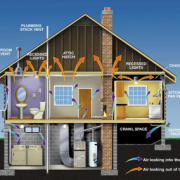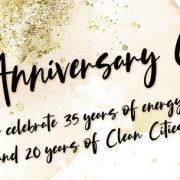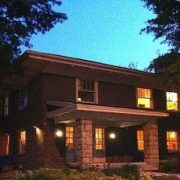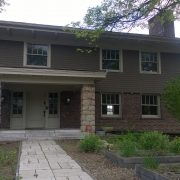written by MEC Greater Kansas Clean Cities coordinator Jenna Znamenak
This article chronicles recent efforts by Metropolitan Energy Center (MEC) and its Clean Cities Coalitions to make electric vehicle operations a reality in areas that are often left out of new connectivity trends.
To a person who has always lived in a highly populated city, connectivity is a daily reality. Cities get the fastest internet, the most cell coverage, and more nicely paved trafficways. But for the 20% of the population of the United States who live in rural areas, equal connectivity has never been the norm.
As reported in the January/February issue of the Kansas Government Journal by Mike Scanlon, City Manager of Osawatomie, Kansas, “It is no secret that rural communities are historically left behind when the United States adopts the latest technology.” And in recent months, more rural leaders are seeing a potential pitfall that could widen the access gap for their communities: the advancement of electric vehicles (EVs).
As the latest consumer-use scenarios are analyzed and early-adopter reviews roll in, the reality is clear: EVs cost less money to fuel and to maintain than their gasoline-fueled counterparts. And with the recent monumental increases in grants and tax incentives for EV purchases, governments are becoming much more interested in EV funding pipelines than they are in vehicles fueled by oil pipelines. But urban and suburban governments are making the switch much faster than rural governments.
Scanlon is not surprised, but he is hopeful that this time rural America can keep up with the trend. “By 2030 the federal government proposed that half of all new cars sold in the U.S. will be zero-emission vehicles, with 50,000 electric charging networks. By proactively supporting rural EV development now, we can prevent history from repeating itself.” His article in the Kansas Government Journal, co-written with MEC’s Central Kansas Clean Cities Coalition coordinator Jenna Znamenak, prepares rural leaders with real facts and funding connections so they can stay in the fight to stay connected.
The most exciting grants on the list are the ones that get rid of nitrous-oxide-producing diesel school buses by helping school districts convert to EVs, for little to no cost to the schools. “These grants replace older school buses with electric school buses to reduce harmful emissions around children,” says Central Kansas Clean Cities coordinator Jenna Znamenak. But she says there are enough programs available through MEC’s grant assistance to help more institutions than just schools involved with the national sea-change.
For many rural leaders, adapting to standardizing trends sounds like “small budgets with not much room for experimentation, time constraints that do not allow us the ability to learn about technology, and grant opportunities that can look like a 10-acre corn maze,” says Scanlon. “That’s why we’re here for you—we’ve helped connect local communities and fleets to easier funding for clean energy for the past 40 years,” says Znamenak, referring to MEC’s stockpile of resource-accessing tricks and their dependable grant assistance services.
See the original article published in the Kansas Government Journal here.
To stay current on all available funding, sign up for MEC’s free newsletter at metroenergy.org/newsletter-sign-up. To talk to an expert about your next clean energy project, call 816-531-7283.






